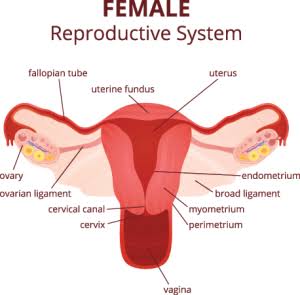- Get link
- X
- Other Apps
Ovarian Cancer
Ovary is the female reproductive organ in which ova or eggs are produced. The three important functions of ovaries are to secrete hormones, they protect the eggs a female is born with and they release egg for possible fertilization.
There are different types of cancer that arise from cells of the ovary. Most commonly, tumors arise from the epithelium, or lining cells of the ovary. These include Epithelial ovarian (from the cells on the surface of the ovary), Fallopian tube, and Primary peritoneal (the lining inside the abdomen that coats many abdominal structures) cancer.
Types of Ovarian Cancer
- Epithelial Ovarian Cancer :- About 90% of ovarian cancer starts in the epithelium tissue, which is the lining on the outside of the ovary. The risk of epithelial ovarian cancer increases with age, especially after the age of 50.
- Germ Cell Ovarian Cancer :- This account for about 5% of ovarian cancers. They begin in the egg producing cells. This type of ovarian cancer can occur in women of any age, but about 80% are found in women under the age of 30.
- Stromal Ovarian Cancer :- About 5% of ovarian cancers grow in the connective tissue that holds the ovary together and makes estrogen and progesterone. Most are found in older women, but sometimes they occur in girls. Stromal tumors usually do not spread as fast as other ovarian tumors.
- Primary Peritoneal Ovarian Cancer :- This is a rare type of cancer, it has cells like those on the outside of the ovaries, but it starts in the lining of the pelvis and abdomen. Women can get this type of cancer even after their ovaries have been removed. Symptoms and treatment are similar to epithelial ovarian cancer. Fallopian tube cancer is also a rare type of cancer. It starts in the fallopian tube and acts like epithelial ovarian cancer , symptoms and treatment are similar to ovarian cancer.
Stages of Ovarian Cancer
- Stage 1 :- The cancer is found in one or both ovaries. The cancer cells may be on the surface of the ovaries or in fluid collected from the abdomen.
- Stage 2 :- The cancer has spread to other tissues in the pelvis. Cancer cells may be in fluid collected from the abdomen.
- Stage 3 :- The cancer has spread to tissues outside the pelvis to organs of the abdomen or to nearby lymph nodes.
- Stage 4 :- The cancer has spread outside the pelvis and the abdomen to distant parts of the body.
Risk Factors
- Age :- Ovarian cancer is most common in women over 50 and in women who have stopped menstruating and the risk increases with age.
- Endometriosis :- This is a benign (non-cancerous) condition in which the tissue that lines the uterus (endometrium) is also found in other areas of the body.
- Reproductive history :- Women who have not had children, were unable to have children, or had children over the age of 30 may be slightly more at risk.
- Life-style factors :- Women who are obese, overweight or eating a high fat diet are at risk.
- Hormonal factors :- Early puberty or late menopause, or using oestrogen -only hormone replacement therapy (HRT) for 5 years or more.
Causes
The causes of ovarian cancer is not clear. In general, cancer can invade nearby tissues and break off from an initial tumor to spread elsewhere in the body. i. e. metastasize.
Symptoms
- Pain during sex
- Pelvic or abdominal pain
- Bloating
- Constipation
- Menstrual changes
- Back pain
- Trouble eating or feeling full quickly
- Fatigue
- Feeling the need to urinate urgently or often
- Upset stomach or heartburn
Treatments and Medications
Treatment options vary depending on the stage of the cancer and are assessed into account the following variables:-
- Tumor size
- Tumor position
- Degree of spread
- Patient's physical condition
- Treatment options are:-
- Surgery which requires the removal of one or both of the ovaries (bilateral oophorectomy) and the removal of the uterus (hysterectomy). Most patients commonly have both ovaries removed.
- Chemotherapy
- Biological therapies
Prevention
- Eat a healthy diet with plenty of fruits, vegetables and whole grains.
- Use of oral contraceptives, especially for more than 10 years may increase your chances of developing ovarian cancer.
- Daily use of aspirin may inspire ovarian cancer
- Previous pregnancy may help prevent it
- Breast feeding is also good in preventing ovarian cancer
- Get link
- X
- Other Apps
Comments



Very much informative and a good content
ReplyDelete